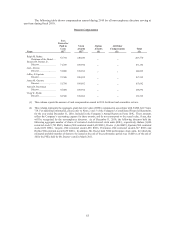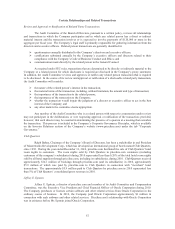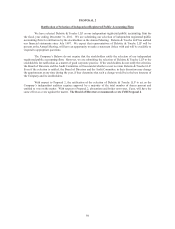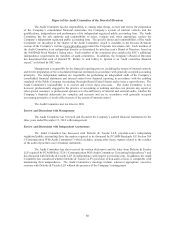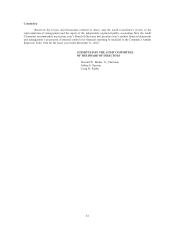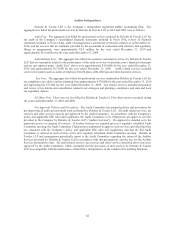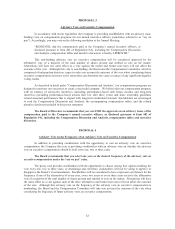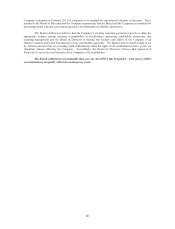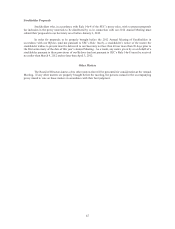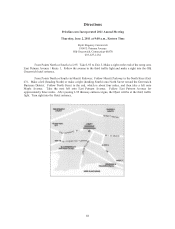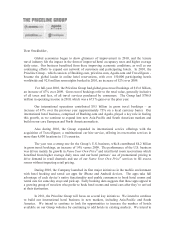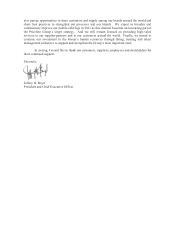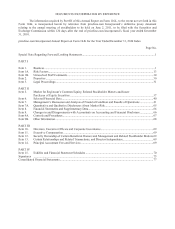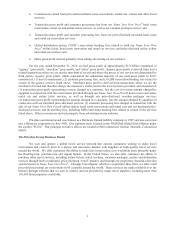Priceline 2010 Annual Report Download - page 67
Download and view the complete annual report
Please find page 67 of the 2010 Priceline annual report below. You can navigate through the pages in the report by either clicking on the pages listed below, or by using the keyword search tool below to find specific information within the annual report.65
Board of Directors Statement in Opposition to Proposal 5.
The Board of Directors Recommends a Vote AGAINST this Proposal 5.
The Board of Directors believes in good corporate governance and in providing stockholders with
meaningful access to the Company. The Company has adopted a number of sound corporate governance
practices that are designed to ensure that the Company remains transparent and accountable to our stockholders.
First, at each annual meeting of stockholders, our stockholders have the ability to vote on important matters that
are presented at the meeting. Second, if important matters arise between annual meetings of stockholders, the
Company’s certificate of incorporation provides that the Chairman of the Board, the Vice Chairman of the
Board, the Chief Executive Officer, the Board of Directors or stockholders holding at least twenty-five percent
(25%) of the Company’s shares, may call a special meeting of stockholders. This twenty-five percent (25%)
threshold for our stockholders to call a special meeting is less than the percentage that would be required to effect
action by written consent under Proposal 5. Third, the Company recently implemented a majority vote standard
in uncontested elections of directors, which means that directors generally will only continue to serve if they
receive the support of a majority of shares cast. Fourth, the Company continues to maintain its existing corporate
governance mechanisms that afford all stockholders, regardless of the level of share ownership, with the ability
to contact the Board of Directors or the non-employee directors with any comments or concerns. Fifth,
stockholders have the ability to recommend to the Company’s Nominating and Corporate Governance
Committee their own nominees for directors, which would be considered by the committee in accordance with
standards and procedures that the Company has adopted. The Board of Directors believes that these practices
promote stockholder democracy and sound corporate governance and that permitting stockholder action by
written consent would negatively impact these objectives.
The Board of Directors believes that implementing this proposal is not in the best interests of the
Company and our stockholders and would harm stockholder democracy because it would allow certain
stockholders with the minimum number of votes that would be necessary to authorize a certain action to act
before all of our stockholders have had an opportunity to participate or vote and before all views, including the
views of the Board of Directors, have been heard and considered. Permitting stockholders to act by written
consent outside of a stockholder meeting setting would permit a subset of stockholders to take action without the
participation of or notice to other stockholders. The Board of Directors believes that all of our stockholders
should have the opportunity to be informed about, and vote on, any matter submitted to stockholders.
The Board of Directors believes that the written consent process is not as well suited as an actual
meeting for an orderly and informed debate on the merits of a proposed stockholder action. For instance, at an
annual or special meeting of stockholders, our stockholders are given notice and an opportunity to participate in
such meetings. These formal meetings allow information to be disseminated to all stockholders, provide the
opportunity for discussion and the ability of all stockholders to have their views considered, and facilitates a
transparent, public, orderly and deliberate consideration of the issues facing the Company. Thus, by requiring
the matter to be brought up, considered and voted upon at a meeting of the Company’s stockholders, as is
currently the case under the Company’s existing corporate governance practices, the Board of Directors has
safeguarded the right of all stockholders to consider, participate in and vote on the matter.
The lack of transparency of the voting process when stockholders are able to act by written consent is
of particular importance in light of the potential abilities of activist investors who may have a special or unique
agenda or interest that may not be in the best interests of all of our stockholders. This is particularly the case
when the temporary borrowings of shares by an investor can distort an investor’s true ownership, simply for the
purpose of trying to cause an action to be effected by written consent outside of a stockholder meeting.
Further, the Board of Directors, which has a duty to oversee the management of the business and affairs
of the Company and to act in the best interests of our stockholders, believes that it should always have an
opportunity to evaluate any stockholder proposal and to provide our stockholders with its recommendation with
respect to any such proposal. If this Proposal 5 were implemented, then the Board of Directors may not always
have such an opportunity to provide its views to our stockholders on a matter that is submitted through a written
consent action outside of a formal meeting.
The Company’s management and the Board of Directors regularly review and evaluate ways to
improve the Company’s corporate governance, as demonstrated by the Company’s adoption in 2009 of the right
of stockholders owning 25% or more of the Company’s shares to call special meetings of stockholders and the


